Mind Games. Films reviewed: Spiderhead, Chess Story, In the Wake
Hi, this is Daniel Garber at the Movies for culturalmining.com and CIUT 89.5 FM.
Spring film festival continues through June with Toronto’s Japanese Film Festival and the Toronto Jewish Film Festival showing films for another week. Also on now is the Future of Film Showcase, Canada’s premiere festival for short films. It also has panels, coffee sessions and workshops, covering everything from casting to funding, from locations to issues like equity.
This week, I’m looking at three new movies about people forced to play games. There’s a prisoner playing chess in WWII Vienna, another prisoner forced to play mind games in a secretive American facility; and a detective playing cat-and-mouse with a murderer… ten years after an earthquake in Japan.
Dir: Joseph Kosinski (Top Gun: Maverick)
Jeff (Miles Teller) is an inmate in a remote, high-security prison. Located inside a brutalist cement building on a placid lake, it can only be reached by boat or pontoon prop plane. But inside it’s a virtual paradise. Doors are kept unlocked, prisoners chat on colourful sofas while eating canapés, and are free to pursue their favourite pastimes. They can even become friends with other prisoners — like Lizzy (Jurnee Smollett). No violence or distrust here; the benevolent warden Steve (Chris Hemsworth) makes sure of that.
So what’s the catch?
All prisoners are kept placid by a little gadget attached to their bodies, which — through remote control — releases chemical serums directly into their bloodstreams which controls their moods. They are also forced to attend sessions — controlled by Steve and his assistant behind a glass wall — where they test the potency of their pharmaceuticals. Sometimes it’s as simple as making them laugh at deliberately unfunny jokes. Other times they’re placed in the room with a stranger — a female prisoner in Jeff’s case — to see if drugs can make them so thirsty and the other seem so attractive (like “beer goggles” times 1000) that they can’t help having sex on the spot. But things take a sinister turn when Jeff is taken behind the glass wall and ordered to remotely inject painful drugs into other prisoners’ bodies. Can Jeff resist the psychological and chemical pressures put on him? What is Chris’s motive behind these experiments? And is there anything Jeff  can do to stop him?
can do to stop him?
Spiderhead — the title is the name of the prison — is a sci-fi psychological thriller, about the dangers of pharmaceuticals and whether we can resist authority if it goes against our beliefs. The film is partly based on the Milgram experiment of the 1960s, where volunteers behind a glass wall were ordered to send increasingly painful electric shocks to actors pretending to be patients. In Spiderhead it’s taken to even greater extremes.
Is this movie good? It’s not too bad — I actually enjoyed it, loved the location and sets (it’s shot in Australia), the cheesy 1980s soundtrack, and the fun concepts, along with some huge movie stars… but the ending is as predictable as it is implausible. The concept is much better than the story. But if you just want be entertained for a couple hours, you could do worse.
Dir: Philipp Stölzl
It’s 1939 in Vienna, and Josef Bartok (Oliver Masucci) is living the high life. He always dressed in formal black and white, and only the finest scotch and the best cigarettes ever pass through his lips. He loves telling jokes with his friends, and waltzing with his beloved wife Anna. As long as the Viennese keep dancing what could go wrong? But that night German soldiers march into Austria declaring Anschluss; it’s all one Reich now. Jacob springs into action, scanning through his ledgers and memorizing the codes before throwing them into a blazing fire. You see, his job is to keep the riches of the Austrian royalty safe from the Nazis in numbered Swiss bank accounts. Hours later he is arrested, but not killed, by the Gestapo and locked in a hotel room. If he tells them the numbers they say they’ll let him go — they just want the money. But solitary confinement can play tricks on your brain. He stays alive by studying a chess book he smuggled into the room.
Later, he is on a ship with Anna heading to America and freedom. But he can’t resist playing  chess against Mirko, an unusual world chess champion, who is illiterate and can barely form a sentence. But as reality begins to warp, he can’t help wonder if he’s on a ship or still a captive of the nazis. And where is this chess game really taking place?
chess against Mirko, an unusual world chess champion, who is illiterate and can barely form a sentence. But as reality begins to warp, he can’t help wonder if he’s on a ship or still a captive of the nazis. And where is this chess game really taking place?
Chess Story is an historical drama based on a story by Stefan Zweig, the last thing he wrote. He died during the war, in Brazil not Austria, but clearly he was damaged before he left. Everything you see in this film is filtered through Josef’s mind, so you’re never quite sure what is real and what is imaginary. Oliver Masucci who plays him is excellent, portraying a man’s descent from carefree joker to broken soul. It feels almost like an episode of The Twilight Zone episode, but with the emphasis on the characters, not on the twist.
 In the Wake (Mamorarenakatta mono tachi e)
In the Wake (Mamorarenakatta mono tachi e)
Dir: Zeze Takahisa
Det. Tomashino (Abe Hiroshi) is a policeman in northeastern Japan. He is investigating the mysterious death of two middle-aged men, both found starved death in different locations. Is there a serial killer out there, and if so, what are his motives? Turns out they both worked out of the local welfare office. He turns to a young welfare case worker Mikiko (Kiyohara Kaya) to help him put the pieces together. This is also the site of a mammoth earthquake and tsunami, ten years earlier. The detective remember it well, as he lost both his wife and his young son. Now he’s a loner who has yet to deal with his losses.
Meanwhile, Tone (Satoh Takeru) a troubled young man, just out of prison for arson, gets a job in a welding factory. And he wants to get in touch with his makeshift family former after the earthquake: a little kid, and an elderly woman named Kei (Baishô Mitsuko) who cared for the two lost orphans. But things have clearly changed. Could they have driven him… to murder?
In The Wake is a Japanese drama set immediately after an earthquake and a decade later. While it’s ostensibly a police procedural, about a detective trying to catch a killer, it’s also a  surprisingly powerful and moving drama, that takes it much deeper than your usual mystery. It shifts back and forth between the two periods, as all the major characters were also survivors of the quake. And it delves into the terrible inadequacies of Japan’s austerity cutbacks to to their already inadequate welfare state. The movie features Abe Hiroshi, a huge star from Kore-eda’s films; Baishô Mitsuko , who was in movies by the most famous Japanese Kurosawa and Imamura; and Satoh Takeru best known for the Rurouni Kenshin series. I was expecting something simple, and lucked into a really good movie instead.
surprisingly powerful and moving drama, that takes it much deeper than your usual mystery. It shifts back and forth between the two periods, as all the major characters were also survivors of the quake. And it delves into the terrible inadequacies of Japan’s austerity cutbacks to to their already inadequate welfare state. The movie features Abe Hiroshi, a huge star from Kore-eda’s films; Baishô Mitsuko , who was in movies by the most famous Japanese Kurosawa and Imamura; and Satoh Takeru best known for the Rurouni Kenshin series. I was expecting something simple, and lucked into a really good movie instead.
Spiderhead is now streaming on Netflix; Chess Story is now playing digitally at TJFF, The Toronto Jewish Film Festival; and In the Wake is playing at the other TJFF, the Toronto Japanese Film Festival, on one day only, June 25th, at the Japanese Canadian Cultural Centre.
This is Daniel Garber at the Movies, each Saturday morning, on CIUT 89.5 FM and on my website, culturalmining.com.
Therapy vs self-medicating. Films reviewed: Canadian Strain, Transfert, Freud
Hi, this is Daniel Garber at the Movies for culturalmining.com and CIUT 89.5 FM.
It’s a tough time for movie critics.
All the cinemas are closed, spring film festivals cancelled, and many new movies originally scheduled for release are postponed. Indefinitely. Meanwhile, like many of you, I’m in isolation, cooped up at home. This will be my first attempt at home recording – please bear with me for the poor sound quality. But when faced with a crisis, you look for alternative ways of dealing with your problems. Some people self-medicate while others turn to therapy. So this week I’m looking at three new movies (all online), two about psychiatry, and one about marijuana. There’s a psychoanalyst in fin-de-siècle Vienna; a psychotherapist in modern Sicily; and an out-of-work cannabis dealer in contemporary Toronto.
Dir: Geordie Sabbagh
Anne (Jess Salgueiro) is a Toronto entrepreneur, who runs a successful business out of her own home. She has long curly hair and a determined look. Anne is kind, reliable and always there for her longtime clients. She likes her work and is good at it. Her social life revolves around her job. And when she needs advice, she turns to her father (Colin Mochrie). She also has an agreement with her mustached boyfriend: they keep there jobs separate. Why? Because she’s a pot dealer and he’s a cop. But when Canada suddenly legalizes cannabis, everything changes.
Suddenly Anne’s longtime clients, people she considers family, all defect to the public option. She’s forced to rethink her entire life. Should she work for The Man? Or try something new?
Canadian Strain is a gentle comedy set in Toronto just a short  while ago, when the province shifted to legal cannabis. It’s more interesting than hilarious. It’s also totally Toronto. It combines bland government bureaucrats, flakes, hippies, grandmas, aggressive men on the prowl, and organized criminals. It’s told through Anne’s point of view, but there are many fascinating side characters, both and good bad, mainly played by women. Definitely a niche movie, but I enjoyed Canadian Strain.
while ago, when the province shifted to legal cannabis. It’s more interesting than hilarious. It’s also totally Toronto. It combines bland government bureaucrats, flakes, hippies, grandmas, aggressive men on the prowl, and organized criminals. It’s told through Anne’s point of view, but there are many fascinating side characters, both and good bad, mainly played by women. Definitely a niche movie, but I enjoyed Canadian Strain.
Wri/Dir: Massimiliano Russo
Stefano (Alberto Mica) is a young psychiatrist in Catania, Sicily. Kind, good-looking and empathetic, he has been fascinated by psychiatry since he was a child. Educated in Bologna, he is back in Sicily looking for new clients to establish his practice. He works out of his home, a modernist flat that he shares with his wife.
Among his first patients are two sisters who live together. Chiara (Clio Scira Saccà) is pretty and vivacious but accident-prone. She’s had three car crashes in the past month… are these accidents intentional? Letizia (Paola Roccuzzo) is mousy and withdrawn but intellectually curious. The two are fiercely competitive and constantly bickering. Stefano treats them equally and separately. He gets along well with all his patients.
But when new client enters the scene – a man who shares his  name – things start to go wrong. This other Stefano (played by the film’s director) though devious and cruel, quickly wins the therapist’s trust. Using sophisticated equipment, bad Stefano spies on his fellow patients. He uses this information to plant the seeds of suspicion in the doctor’s mind, which could lead to terrible consequences. Can a psychiatrist be gaslit by one of his patient? Or will he discover the truth?
name – things start to go wrong. This other Stefano (played by the film’s director) though devious and cruel, quickly wins the therapist’s trust. Using sophisticated equipment, bad Stefano spies on his fellow patients. He uses this information to plant the seeds of suspicion in the doctor’s mind, which could lead to terrible consequences. Can a psychiatrist be gaslit by one of his patient? Or will he discover the truth?
Transfert is an indie, psychological thriller about an innocent, young psychotherapist trapped in a patient’s schemes. This is a low budget film so much of it takes place indoors, with some drone views of the city from above. But it still manages to thrill and surprise. There are visual references to Truffaut, among others. It’s shot in beautiful Catania, a baroque city beside Mt Etna, a volcano ready to erupt (like many of the characters). I like the way Transfert tells the story through a sympathetic therapist’s eyes – something you rarely see. And while I thought the twisted ending was implausible, it still managed to surprise me. I liked this one, too.
Co-Wri/Dir: Marvin Kren
It’s the 1880s. Fin-de-siècle Vienna is a cauldron of new ideas in art, music, architecture and politics – think Mahler, and Berg, Klimt and Loos and many others, all in one city, the hub of the vast Austro-Hungarian empire.
Inspector Kiss (Georg Friedrich) is there, a former soldier with a shaved head and curled mustache. He’s a cop who solves crimes. So is Fleur (Ella Rumpf) a beautiful and dark, sultry young woman part of the Hungarian nobility. She serves as a medium for the countess at séances where she falls into a trance leading to strange voices and ending with a pseudo-epileptic seizure, complete with foaming at the mouth. And then there’s Sigmund Freud (Robert Finster), famous as the father of psychiatry and psychoanalysis. But here he’s an unknown young  neurologist and a recent grad from medical school. He’s trying to establish himself. He has yet to write his first book and lives in an apartment where he is threatened with eviction for not paying rent. He’s just starting to explore the unconscious, but he’s still at the stage of parlour tricks, where he uses his pocketwatch to hypnotize patients. He’s also addicted to cocaine.
neurologist and a recent grad from medical school. He’s trying to establish himself. He has yet to write his first book and lives in an apartment where he is threatened with eviction for not paying rent. He’s just starting to explore the unconscious, but he’s still at the stage of parlour tricks, where he uses his pocketwatch to hypnotize patients. He’s also addicted to cocaine.
These three people are thrown together after a terrible attack on a young woman. Inspector Kiss runs to Freud’s apartment (he’s  a physician) with the victim, saying “save her!”. And Fleur has a vision of who the killer might be, but it’s buried somewhere deep inside her mind. She can’t remember what happens during her trances. It’s up to Freud to hypnotize Fleur to discover the truth. But will that reveal the real killer?
a physician) with the victim, saying “save her!”. And Fleur has a vision of who the killer might be, but it’s buried somewhere deep inside her mind. She can’t remember what happens during her trances. It’s up to Freud to hypnotize Fleur to discover the truth. But will that reveal the real killer?
Freud is a new TV show, a detective mystery/thriller, with a cop, a psychiatrist, and a psychic trying to catch a serial killer in late 19th century Vienna. But that’s just the frame. It’s also a sexual romance, and an historical drama. Throw in decadent royalty, avaricious artistocracy, angry nationalists, rising right-wing  politics, mysticism, misogynyand anti-semitism, duels, and opera… and you’ve got a rich and engrossing drama that’s not your average mystery. And if I’m not mistaken, this is the world’s first sexy Freud, two words I never thought I’d hear in the same sentence. I’m binging this series and am only half through but, so far, it seems well-worth watching.
politics, mysticism, misogynyand anti-semitism, duels, and opera… and you’ve got a rich and engrossing drama that’s not your average mystery. And if I’m not mistaken, this is the world’s first sexy Freud, two words I never thought I’d hear in the same sentence. I’m binging this series and am only half through but, so far, it seems well-worth watching.
Transfert and Canadian Strain are both available online; and you can watch Freud on Netflix.
This is Daniel Garber at the Movies each Friday morning on CIUT 89.5 FM and on my website culturalmining.com.
Fall of the Patriarchs. Films reviewed: Downhill, Sonic the Hedgehog, Nose to Tail
Hi, this is Daniel Garber at the Movies for culturalmining.com and CIUT 89.5 FM.
It’s Valentine’s Day today, as good a time as any to catch a new movie. So this week I’m looking at films about unusual relationships. There’s a husband and wife rejuvenating their marriage at an Alpen ski resort; a divorced, master chef dating the restaurant’s maitre d’; and a super-sonic, electric-blue hedgehog in a bromance with a traffic cop.
Dir: Nat Faxon, Jim Rash
Pete and Billie (Will Ferrell, Julia Louis-Dreyfus) are a happily-married couple. He’s a workaholic and a bit of chowderhead, while she’s an successful, if opinionated, lawyer. Billie is worried about her husband. He spends more time texting than playing with their two sons. And he hasn’t been the sane since his own father died last summer. So when Pete books a family vacation at a ski chalet in the Austrian Alps — and handles all the arrangements — they are all looking forward to a fun, quiet time to heal their inner wounds. When they arrive, they are greeted by an Alpen sexpot named Charlotte (hilariously played by Miranda Otto: Aunt Zelda on CHilling Adventures of Sabrina) who assures them nudity is encouraged and enforced. (Turns out the family lodge is nearby… they’re at the swingers chalet.)
Then Pete secretly invites his younger workmate Zach (Zach Woods) and Zach’s girlfriend Rosie (Zoë Zhao) to join them. But things really get bad when a planned  avalanche crashes near the chalet, sending patrons on an outdoor patio running for cover in the sudden whiteout. Turns out, Billie stayed behind to protect the kids from what they thought was their final moment. And Pete the family patriarch? He grabbed his smart phone and ran, leaving his family to die. No one did die, of course, but now Billie and the kids feel abandoned by Pete in a dangerous crisis.
avalanche crashes near the chalet, sending patrons on an outdoor patio running for cover in the sudden whiteout. Turns out, Billie stayed behind to protect the kids from what they thought was their final moment. And Pete the family patriarch? He grabbed his smart phone and ran, leaving his family to die. No one did die, of course, but now Billie and the kids feel abandoned by Pete in a dangerous crisis.
Will Pete ever regain Billie’s trust or his his kids’ respect? Or are his marriage, his family and his self confidence damaged beyond repair?
Downhill is a mildly funny dramatic comedy about the fall from power of the proverbial middle class white American male. It’s also an American remake of the brilliant Swedish film Force Majeure. But it’s less visually attractive, less biting and bitter than the original, trading subtlety for the broad strokes of tired Euro stereotypes. Odd sex has been replaced by straightforward moral lessons. Louis-Dreyfus is great as Billie, conveying her hurt and suspicion through a single squint or pursed lip. Ferrell is less successful as a clueless Joe Biden-type, seemingly unaware of his imminent downfall.
Downhill is OK, but not great.
Dir: Jeff Fowler
Sonic is an electric-blue hedgehog who lives in a cave furnished with a beanbag chair and a ping pong table, near Green Hills, Montana. He looks like a plush toy with spaghetti legs, a button nose and bright red sneakers. And he can run faster than anything else on earth. He’s so fast he can play ping pong with himself. He’s so fast he can play all the bases on a baseball game at once, pitching a fastball from the pitcher’s mound and then hitting it from home plate. When he’s truly in danger he rolls up into a small blue ball and can generate mammoth amounts of electricity. He carries a bag of golden rings, magic portals that can instantly take hint to any place in the universe.
Sonic is a social animal who speaks perfect English (voiced by Ben Schwartz) and would love to meet  friends, but is forced to remain hidden. If anyone found him – or discovered his secret powers – he would be in great danger.
friends, but is forced to remain hidden. If anyone found him – or discovered his secret powers – he would be in great danger.
But when he accidentally triggers an interstate blackout, the DC generals fear an enemy attack. They send out an expert to solve the problem and capture the so-called terrorist. This expert is the infamous Dr Robotnik (Jim Carrey) a brash and arrogant genius with multiple PhDs and a curly moustache. He plans to find the elusive source of the blackout… and dissect him. Luckily, Sonic is taken under the wing of the local speed-trap cop named Tom (James Marsden). Although dubious at first, eventually Tom takes to the hedgehog and the two  become fast friends They set off on a roadtrip to San Francisco to evade Robotnik, recover the lost gold rings and save the world. But who will triumph? The evil Dr Robotnik? Or the fast little hedgehog and his buddies?
become fast friends They set off on a roadtrip to San Francisco to evade Robotnik, recover the lost gold rings and save the world. But who will triumph? The evil Dr Robotnik? Or the fast little hedgehog and his buddies?
Sonic the Hedgehog is a kids movie based on the famous Sega video game. I have said it before and I’ll say it again, movies based on video games is the worst new genre out there. But you know what? I actually enjoyed this one. It’s silly of course, but the special effects are terrific. And the scenes shot from Sonic’s point of view, where everyone else seems frozen in time – like a barfight in a roadhouse where the spiny mammal runs rampant around redneck bikers – are totally fun to watch. OK, there’s relentless product placement (the whole movie is basically an ad) but still… it is fun. And Jim Carrey is a perfect as the villain and very funny.
If you see it, remember to watch it until the credits roll.
Wri/Dir: Jesse Zigelstein
Dan (Aaron Abrams) is an arrogant, self-centred master chef at a restaurant in downtown Toronto. He oversees every dish and inspects each outsourced vegetable that arrives in the morning. If anyone in the kitchen steps out of line, he lashes out like a boot camp sergeant. Dan starts his day with a makeshift breakfast of single malt whiskey and prescription drugs. The restaurant is everything to him. He depends on Chloe (Lara Jean Chorostecki) at the front of house, Keith, his Chef de Cuisine ( Brandon McKnight) in the kitchen, and Steven his sommelier (Salvatore Antonio) to keep the wine cellar well stocked. Problem is his world is collapsing all around him.
He’s four months overdue on the rent. Online bloggers are dissing his abrasive manners (fuckin’ millennials!). Keith is heading for greener pastures and his bills are piling up. He stood up Chloe (his on-again, off-again girlfriend) and has berated and verbally abused his entire staff, burning bridges all around him. Then his ex-wife drops by with unexpected news, and a popular new food truck parks right across the street. Everything  depends on a high school friend and millionaire (Ennis Esmer) who is coming for dinner that night. Will he invest in the business? Or will the restaurant – just like the heritage pig he cuts up on camera, from nose to tail – go belly up?
depends on a high school friend and millionaire (Ennis Esmer) who is coming for dinner that night. Will he invest in the business? Or will the restaurant – just like the heritage pig he cuts up on camera, from nose to tail – go belly up?
This isn’t the first drama about a high-strung egotistical chef – think Bradley Cooper in Burnt and Jon Favreau in Chef, to name just two – but Nose to Tail has a level of intensity and density – the whole movie lasts just one day – that beats those other two hands down. And Aaron Abrams (The Go-Getters) gives a tour de force performance, keeping close to the boiling point till the bitter end.
Downhill, Sonic the Hedgehog, and Nose to Tail all open today in Toronto; check your local listings.
This is Daniel Garber at the Movies, each Friday morning, on CIUT 89.5 FM and on my website, culturalmining.com.
Good not good. Films reviewed: Bombshell, A Hidden Life, Cats
Hi, this is Daniel Garber at the Movies for culturalmining.com and CIUT 89.5 FM.
Ever watch something that’s bad, but still has good parts? Or a beautifully rendered piece of art that doesn’t live up to its potential? This week, I’m looking at three new films, that I liked but didn’t like, or hated but still enjoyed. There’s one farmer in wartime Austria, three women at Fox News, and a hundred cats in London.
Dir: Jay Roach
It’s Fox News studios in New York City. Megyn Kelly (Charlize Theron) is a top TV journalist and news anchor, Gretchen Carlson (Nicole Kidman) is co-host of Fox & Friends, Donald Trump’s favourite show, and newcomer Kayla Pospisal (Margot Robbie) is a committed conservative evangelical, trying to advance her career. What do these three women have in common? Theyre all smart, conservative and attractive (Carlson is a former Miss Minnesota.) And they were all hired by Roger Ailes (John Lithgow). Ailes is the highly profitable Fox News CEO, the man who singlehandedly shifted cable journalism from neutral news-source to a font of blatantly partisan right-wing talking points, leaving CNN in its dust. He’s also paranoid and hideously ugly, called Jabba the Hut behind his back.
of blatantly partisan right-wing talking points, leaving CNN in its dust. He’s also paranoid and hideously ugly, called Jabba the Hut behind his back.
The Fox News he runs is a place where cameras are positioned to show off female newscasters’ legs. Male employees advance because of their work. Female employees are also judged on looks, and work in a blatantly sexist office culture. And Ailes is the centre of it all, using his position power to exploit, harass and sexually assault young women. Kelly shares her  concerns with her husband and Pospisal with her lesbian lover and Fox News staffer (Kate McKinnon) who says she doesn’t want to hear about it. But Carlson refuses to take this lying down. She launches a lawsuit against Ailes and Fox News. But will other journalists, like Kelly and Pospisal (a composite character based on real people) join her struggle, or stay loyal to Ailes?
concerns with her husband and Pospisal with her lesbian lover and Fox News staffer (Kate McKinnon) who says she doesn’t want to hear about it. But Carlson refuses to take this lying down. She launches a lawsuit against Ailes and Fox News. But will other journalists, like Kelly and Pospisal (a composite character based on real people) join her struggle, or stay loyal to Ailes?
Bombshell is a fast-paced news drama based on recent real-life events. It’s told in a light, punchy and easy-to-digest format, which makes the few dramatic scenes showing sexual harassment all the more powerful. Theron, Kidman and Robbie are all terrific and believable in their roles. On the ther hand, the movie barely touches on the awfulness and deceit of Fox News itself. And while it skewers Ailes it leaves the notorious Rupert Murdoch strangely untouched. Bombshell tells a great story, as seen by three strong women, around sexual harassment, but doesn’t concern itself with other political matters.
Wri/Dir: Terrence Malick
It’s WWII in Austria. Franz Jägerstätter (August Diehl) is a simple farmer deeply in love with his wife Fani (Valerie Pachner). They live with his mother, her sister and their three little girls inthefoothills of a dramatic mountain range. Together with their neighbours they till the fields, harvest the grain and carry it, on the back of a donkey, to the miller. They go to church on Sunday and dress up in masks and costumes to honour the harvest. Their life is idyllic until… Franz gets drafted for army duty a second time. Enough, he says. I’m not going. No more Heil Hitler’s, no more military uniforms, no more separation from my wife and kids. Enough! Neighbours and government officials try to convince him to sign a loyalty oath, but he refuses. He is sent to prison, leaving his wife and sister-in-law to plow the fields among neighbours who aren’t friendly anymore. Only their constant letters keep them sane and I love. Will Franz sign the oath, or will he stay steadfast to his beliefs, even at risk of death?
A Hidden Life is a lush and beautiful rendering of a simple act of resistance in wartime anschluss Austria. It’s directed by Terrance Mallick, and is instantly recognizable by its swirling images, breathy voiceovers, lush music and stunning camerawork. People clutch earth in their fingers, and reap fields with scythes. Good passionate acting, featuring cameo performances by Matthias Schoenaerts, Franz Rogowski, and the late, great Bruno Ganz.
On the other hand… it’s three hours long. Three hours! Why does it take so long to tell such a simple story? Why? It’s not exactly boring or tedious since it’s done so beautifully, but similar stories have already been told (and in a more dramatic fashion, like Oliver Hirschbiegel’s 13 Minutes/Elser – Er hätte die Welt verändert). As a movie critic, I try to avoid terms like “self-indulgent”, but this movie is strictly for fans of Terrence Mallick.
Dir: Tom Hooper
It’s nighttime in a fantastical, pre-gentrified London, where abandoned alley cats rule the streets. The Jellicle Cats are gathered for their annual meeting, presided over by Old Deuteronomy (Judy Dench), who will choose one cat to be reborn. Each contestant performs before the queen: There are dancers (Francesca Hayward, Steven McRae) singers (Taylor Swift, Jennifer Hudson), comics (Rebel Wilson, James Corden), a  magician dressed in black and white (Laurie Davidson) and even an old theatre cat (Ian McKellen). But the age-old ceremony is challenged by the evil Macavity (Idris Elba) who is kidnapping each cat after their performance. Who will be chosen to ascend to the skies? Will peace and order return to the Jellicle cats? And can newbie Victoria join the gang?
magician dressed in black and white (Laurie Davidson) and even an old theatre cat (Ian McKellen). But the age-old ceremony is challenged by the evil Macavity (Idris Elba) who is kidnapping each cat after their performance. Who will be chosen to ascend to the skies? Will peace and order return to the Jellicle cats? And can newbie Victoria join the gang?
Cats is a strange hybrid of theatre, and movie special effects. Each act is performed on a vast soundstage, keeping close to how it would look before a live  audience. The cat people’s faces and bodies are human, but augmented, using CGI, with cat ears, moving tails and furry bodies. Some of them wear elaborate costumes, while others run around “naked”, covered in sleek fur. But they’ve all been digitally neutered, with no sign of breasts or genitals anywhere. The script is abysmally bad, almost babyish, with “jokes” like cat got your tongue? and relentless fat jokes. Fat jokes? Really?
audience. The cat people’s faces and bodies are human, but augmented, using CGI, with cat ears, moving tails and furry bodies. Some of them wear elaborate costumes, while others run around “naked”, covered in sleek fur. But they’ve all been digitally neutered, with no sign of breasts or genitals anywhere. The script is abysmally bad, almost babyish, with “jokes” like cat got your tongue? and relentless fat jokes. Fat jokes? Really?
Music ranges from torch songs to chorus lines. There are a few great scenes, like cockroaches  doing elaborate Busby Berkeley formations as Rebel Wilson eats them, one by one; and impressive dance routines, along with some good songs… but I can’t figure out who the movie is trying to appeal to? Small children? Theatre buffs? Taylor Swift fans? I don’t think it knows, either.
doing elaborate Busby Berkeley formations as Rebel Wilson eats them, one by one; and impressive dance routines, along with some good songs… but I can’t figure out who the movie is trying to appeal to? Small children? Theatre buffs? Taylor Swift fans? I don’t think it knows, either.
Still… I kinda liked it, if just for the spectacle of it all. It’s bad, but it’s watchable and loaded with great singers dancers and prize-winning actors all of whom are far, far more talented than the material they’ve been given.
And I think these weird cat people will haunt my sexual nightmares for years to come.
Bombshell, A Hidden Life and Cats all open today in Toronto; check your local listings.
This is Daniel Garber at the Movies, each Friday morning, on CIUT 89.5 FM and on my website, culturalmining.com.
Christoph Schlingensief: Approach those you fear. Films discussed: The German Chainsaw Massacre, The 120 Days of Bottrop, Foreigners Out! Schliegensief’s Container
 Hi, this is Daniel Garber at the Movies for culturalmining.com and CIUT 89.5 FM.
Hi, this is Daniel Garber at the Movies for culturalmining.com and CIUT 89.5 FM.
Christoph Schlingensief was a performance artist, TV producer and filmmaker known for his pranks. A Till Eulenspiegel for the new millenium. He was born in 1960 in Oberhausen, Germany and made his first film while still a kid. He became a devotee of avant garde film, music videos, mainstream Hollywood, and the New German Cinema.
His work incorporates Brechtian theatre techniques and its exaggerated, in-your-face style. In any given film you can find contemporary art, TV clips, historical footage, and even samples of his own past work, edited into the project. He became widely known in German- speaking Europe — though not outside it — for his TV shows, especially an impromptu talk show shot on Berlin’s U-Bahn. Sadly, he died of cancer in 2010 at the age of 49.
speaking Europe — though not outside it — for his TV shows, especially an impromptu talk show shot on Berlin’s U-Bahn. Sadly, he died of cancer in 2010 at the age of 49.
You’ve probably never seen his work, so this week, I’m going to talk about a special series of three movies now playing in Toronto, sponsored by the Goethe Institut (and co-presented by the Laser Blast Film Society and KinoVortex). There’s a look at German unification using cannibal serial killers, an epitaph to New German Cinema in the form of naked people running rampant, and a take on right-wing politcs and xenophobia using a mock reality show… that “deports” undocumented immigrants!
 The German Chainsaw Massacre (1990) (Das deutsche Kettensägen Massaker a.k.a. Blackest Heart)
The German Chainsaw Massacre (1990) (Das deutsche Kettensägen Massaker a.k.a. Blackest Heart)
It’s Germany just after the reunification of East and West. Almost everyone has moved westward, but a tiny few remain in the East. This includes the beautiful but downtrodden Clara (Karina Fallenstein) who is repeatedly abused by her drunk husband. She fights him off with a kitchen knife, jumps into her Trabant and heads for greener  pastures. But little does she know, she’s going from bad… to wurst.
pastures. But little does she know, she’s going from bad… to wurst.
She meets up with her boyfriend Artur only to see a stranger slash up poor Artur’s body. And when she seeks help at roadside inn, she’s accosted by a sex-craazed lesbian dressed in black (Sussanne Bredehöft, who also plays Clara’s husband),  and her equally weird colleagues. Behind closed doors they put rubber masks on anyone who stays there and brutally chops them up before grinding them into sausage. Can Clara defeat these evil cannibals? Or will she end up on someone’s BBQ?
and her equally weird colleagues. Behind closed doors they put rubber masks on anyone who stays there and brutally chops them up before grinding them into sausage. Can Clara defeat these evil cannibals? Or will she end up on someone’s BBQ?
The German Chainsaw Massacre is the second chapter of Schlingensief’s German Trilogy. It’s a genuine horror movie, but so over-the-top that you can’t take it seriously. Its actually very funny, in a disgusting sort of way, mimicking American slasher movies while also satirizing German fears of reunification. (I think it’s also a comment on how ordinary people in the East were treated like pack animals — or sausages! — to feed the hungry West German labour market.)
 The 120 Days of Bottrop (1997)
The 120 Days of Bottrop (1997)
Whatever happened to German Cinema? Schlingensief wants to know. Where are the great directors like Fassbinder, the stars like the beautiful Romy Schneider and 70s heartthrob Helmut Berger? So he decides to get Fassbinder’s stars back together again to film a remake of Pasolini’s most controversial movie: Salo or 120 days of Sodom.
The original film was about Nazi occupied northern Italy, where they conducted horrific S&M orgies using people as sex slaves for their entertainment. This new version, though, is a low budget German art film, and the actors only agree to come out of retirement for the chance of working with Helmut Berger (or maybe sex with the nude models.)
version, though, is a low budget German art film, and the actors only agree to come out of retirement for the chance of working with Helmut Berger (or maybe sex with the nude models.)
But professional jealousy and rivalry soon takes over, and everything falls apart. The “director” is a mock-Fassbinder complete with fake moustache, while the cast is composed of leches and divas who are going crazy, entering dementia or attempting suicide.
Can this film ever be made? And will Helmut ever show up?
This film is a panoply of meta-references to other movies. Schlingensief is there as Jesus on the cross (who a Klansman tries to set on fire) alongside medieval nuns (Pasolini-style), New York pop-art fashion (Warhol-style), with cameo performances ranging from the omnipresent Udo Kier, to Roland Emerich, Germany’s big-budget schlockmeister. Bottrop is a funny (if ridiculous) satirical look at the last gasp of New German Cinema.
 Foreigners Out! Schliegensief’s Container (2002)
Foreigners Out! Schliegensief’s Container (2002)
Dir: Paul Poet
It’s June 2000 in peaceful, culture-loving Vienna, when something unheard of happens. The conservative party forms a coalition with the ÖVP, Austria’s extreme rightwing Freedom party, headed by Nazi apologist Jörg Haider. The ÖVP is populist and xenophobic, portraying asylum seekers as drug dealers and killers (sound familiar?). That’s when Christoph Schlingensief set up a display – inside a shipping container – right beside Vienna’s Opera house, called Please Love Austria, to commemorate  this coalition.
this coalition.
He brought in a dozen people of varied ethnicities, dressed them in fright wigs and let them live there for a week on display, in person and online, 24/7. And like the reality show Big Brother, viewers are asked to vote to evict two contestants each day. The catch is, these evicted contestants, whom he says are illegal immigrants, are led off by security guards and (supposedly) deported! And just in case you didn’t get the message, a huge white banner on the container’s roof says: Ausländer Raus! (Foreigners Out!) And Schlingensief gleefully announces the colour of the people Austrians vote to deport – dark skin first, light skin later.
Naturally, this art installation triggers extreme reactions. On the far right, people began to shout and demonstrate to deport all foreigners. Some leftists take it at  face value, and attempt to storm the container to “rescue” the so-called foreigners and tear down the sign. And many in the middle hate the negative attention it brought to Austria… though it’s Austria that voted Haider in.
face value, and attempt to storm the container to “rescue” the so-called foreigners and tear down the sign. And many in the middle hate the negative attention it brought to Austria… though it’s Austria that voted Haider in.
This documentary covers the art installation and the public reaction to it over its week-long run. And punctuated it with the media coverage it received, notably from the Krone group of wildly popular tabloids, who many blame for Haider’s election.
The show never overtly takes the standpoint of the immigrants. They’re just props in his sideshow. Rather it exposes society’s creepiest undercurrents that are usually kept hidden. And it illustrates Schlingensief’s theory that the best way to expose the worst beliefs is to repeat them out loud where everyone can hear them. The louder the better.
It’s only through exaggeration that we can show reality. This exhibit ran almost twenty years ago, but I think anyone can see that it’s more relevant now than ever.
The German Chainsaw Massacre, 120 Days of Bottrop, and Foreigners Out! Schliegensief’s Container are playing on May 10th, 15th and 17th at the Tiff Bell Lightbox as part of Goethe Institiute’s three-part tribute to avant garde filmmaker Christoph Schlingensief.
This is Daniel Garber at the Movies, each Friday morning, on CIUT 89.5 FM and on my website, culturalmining.com.
Source: Christof Schlingensief: art without borders, (c) 2010, Tara Forrest and Anna Teresa Scheer, editors, with a foreward by Alexander Kluge.
February 10, 2012. How Do We Communicate? Movies Reviewed: A Dangerous Method, Chronicle, Safe House
 Hi, this is Daniel Garber at the Movies, for culturalmining.com and CIUT 89.5 FM, looking at high-brow and low-brow movies, indie, cult, foreign, festival, genre and mainstream movies, helping you see movies with good taste, movies that taste good, and how to tell the difference.
Hi, this is Daniel Garber at the Movies, for culturalmining.com and CIUT 89.5 FM, looking at high-brow and low-brow movies, indie, cult, foreign, festival, genre and mainstream movies, helping you see movies with good taste, movies that taste good, and how to tell the difference.
I watch a lot of movies, but film is only one way to communicate. How do you record the truth? Do you write it down? Do you tell it to your friends or whisper it in someone’s ear? Do you text it? Or do you save it in some more durable format?
This week, I’m looking at three movies that centre on recording or preserving information: A Dangerous Method is a historical drama, where talking is prime, and observations are recorded by hand, using pen and ink, in meticulous notes and sent by voluminous, lengthy letters; Chronicle, is a science fiction thriller, where a high school student records his life using a hand-held video camera; and Safe House is an action/thriller, where everything important has been recorded in a single tiny microchip.
Interestingly (at least in these three movies), the more advanced the medium, the shallower the plot.
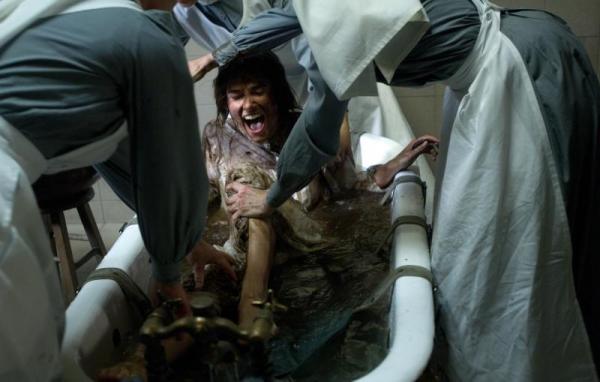 Dangerous Method
Dangerous Method
Dir: David Cronenberg
A woman — at first known only as “S” — is an unusual patient admitted to a mental hospital near Zurich, Switzerland. She shrieks she groans, she writhes, and her face is strangely contorted. She plays with her food and rolls around in the mud! The doctor there, Karl Jung decides to try a new treatment – the Dangerous Method. This unheard-of cure has the doctor  sitting behind the patient who is cured by talking… about her problems, her dreams, her thoughts and her memories. It was pioneered by Sigmund Freud in Vienna, but Jung doesn’t know if it’ll actually work. But soon the patient, Sabina Spielrein, a Russian-Jewish woman, is miraculously cured when they discover something hidden that happened to her as a girl. He puts her to work in the clinic, and she gradually changes from patient to doctor.
sitting behind the patient who is cured by talking… about her problems, her dreams, her thoughts and her memories. It was pioneered by Sigmund Freud in Vienna, but Jung doesn’t know if it’ll actually work. But soon the patient, Sabina Spielrein, a Russian-Jewish woman, is miraculously cured when they discover something hidden that happened to her as a girl. He puts her to work in the clinic, and she gradually changes from patient to doctor.
Then another patient, Otto Gross, who’s also a psychiatrist, arrives smoking pot, snorting coke, and drawing dirty pictures. He’s analyzed by Jung who doesn’t know what to do with him. It’s the early 20th century, not the 1960s,, but Otto’s saying just do it man, give in to your sexual desires. She says she wants you, and you want her… Uptight Jung doesn’t want to… but he also does want to. And Sabina makes it clear  what she wants. What’s he gonna do?
what she wants. What’s he gonna do?
This is a really good movie, an interesting historical biopic, about the dawn of psychiatry, the rivalry between Freud and Jung, and the passionate, but illicit, love affair between Jung and Sabina Spielrein. Cronenberg made a beautiful movie filled with the exquisite European gardens, antiseptic,  white hospital beds, and steampunk clinical devices. Fassbender is great as Jung, Viggo Mortensen interesting as a new type of Freud — imagined as a big, burly, tough-guy patriarch; and Vincent Cassel is terrific as Otto the counter-culture hedonist. But the real star is Keira Knightley as Sabina, the conflicted, smart, pervy and passionate young woman. Sometimes, I wasn’t sure whether Sabina, the character, was really that crazy, or if she was just putting it on for her doctors, (and Knightley’s accent shifted from Russian to Danish-sounding and back again), but she was still amazing to watch.
white hospital beds, and steampunk clinical devices. Fassbender is great as Jung, Viggo Mortensen interesting as a new type of Freud — imagined as a big, burly, tough-guy patriarch; and Vincent Cassel is terrific as Otto the counter-culture hedonist. But the real star is Keira Knightley as Sabina, the conflicted, smart, pervy and passionate young woman. Sometimes, I wasn’t sure whether Sabina, the character, was really that crazy, or if she was just putting it on for her doctors, (and Knightley’s accent shifted from Russian to Danish-sounding and back again), but she was still amazing to watch.
Andrew (Dave de Haan) is a high school kid in Seattle. His mother is bedridden and dying. His dad is a frustrated ex-fireman who likes smacking his only son around. Andrew’s a bit scrawny, a bit hard to talk to, not an athlete, and can’t defend himself. Instead he decides to keep a record of all the indignities and abuses he suffers with a video camera that he’ll carry around wherever he goes. He’s bullied at school, he’s bullied at home, he’s even bullied by the boys in the hood loitering on the corner. He doesn’t have any friends, and is still a virgin. But at least now he has an identity: he’s “the guy with the camera”. We – the audience — see whatever his camera sees.
He occasionally hangs out with his much richer, bigger, better-looking smarter, and more popular cousin Matt (Alex Russell) who, most important, has a car. Matt likes to quote Schopenhauer and Jung. Andrew wonders what Jung would say about glow sticks.
So one night at an outdoor rave, Steve (Michael B Jordan) — the 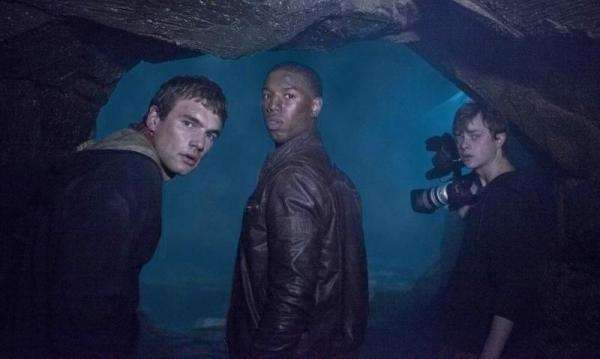 quarterback with the cheerleader girlfriend and who’s running for class prez — asks him to come take some footage of something weird. It’s a strange, glowing crystal deep in a cave nearby. They spelunk down underground. There’re some clicking noises, a flash, and then they all wake up somewhere else. But they’re not the same anymore. They can move things around by telekinesis! But will they use they use the powers for good… or for evil? Or just to get laid? Well, as it turns out, all three.
quarterback with the cheerleader girlfriend and who’s running for class prez — asks him to come take some footage of something weird. It’s a strange, glowing crystal deep in a cave nearby. They spelunk down underground. There’re some clicking noises, a flash, and then they all wake up somewhere else. But they’re not the same anymore. They can move things around by telekinesis! But will they use they use the powers for good… or for evil? Or just to get laid? Well, as it turns out, all three.
The three guys make a pact to keep their new powers a secret, not to hurt anybody, and as Matt warns — to avoid hubris at all costs.
As their powers grow they find themselves tied to one another with some powerful immutable force that may be entering their brains. Can they fight it off? will they live or die? Will they go to Tibet? Will they change the world?
I liked this movie, too. Its very simple, a lot of fun, and most of it’s left unexplained, (if anything, it’s most like an unauthorized X-Men knock off, filmed in the style of Cloverfield). The mainly TV actors are engaging and new. The camera work is grainy, and jiggly and bumpy, but luckily, once Andrew can move things without touching them he lets the camera float free, making it a much more pleasant to watch. The special effects are great, culminating in the expected flaming and booming battle royale.
SPOILER ALERT
Not exactly a spoiler, since its apparent in the trailers, but I was disappointed by a trend in comic book morality. The American dream says it’s the good, smart and hardworking kid can always overcome his disadvantages. The poor, suffering underdog character overcomes obstacles and becomes the hero who uses his powers for good. The rich and powerful characters are spoiled, privileged and unfeeling, and try to take his power away for their own personal gain. But the poor kid has pluck, brains and gumption and triumphs in the end.
In this movie, the rich, popular kids are the heroes, while the poor, picked-on kid is the sort-of villain. That leaves a bad taste in my mouth.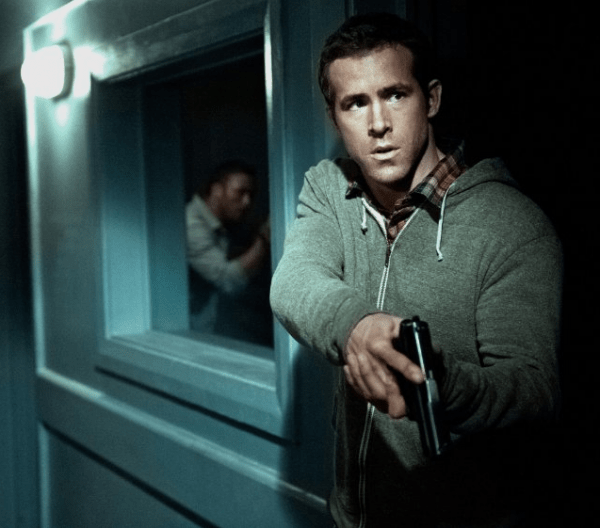
Safe House
Dir: Daniel Espinoza
Matt (Ryan Reynolds) is a low level CIA agent. He’s good at boxing, foreign languages, and strategic analysis. He sits around all day, stationed in a safe house – a secret, high security place where spies can do their stuff – in Cape Town, SA. He just sits around all day, like a Steve McQueen, throwing the baseball against a wall.
Then one day the notorious Tobin Frost (Denzel Washington) comes in from the cold. He’s been a rogue agent, accused of selling CIA secrets for a decade for his own personal game. Frost is an expert spy and a master of disguise. He’s holding a tiny microchip loaded with important information. And he’s being chased by vaguely middle-eastern looking assassins.
But as soon as Tobin’s in Matt’s safe house, (after they warm him up a bit with some complimentary waterboarding), the assassins come barging in and kill everyone – except Matt who escapes with the handcuffed Tobin. he’s disgusted by the violence, but has to remain true to his mission — protect the captive. The rest of the movie is all fight, fight, fight and chase, chase, chase.
The chases take us from a Capetown stadium, through busy city streets,  and into the ramshackle townships where people live in corrugated aluminum shacks lit only by a neon church crosses.
and into the ramshackle townships where people live in corrugated aluminum shacks lit only by a neon church crosses.
The fight scenes are extended and grueling, involving guns, bombs, knives, fists and broken glass. Who do you trust? Who are the real good guys? And is Tobin Matt’s mentor… or his enemy?
This is a fast-moving, never-stopping very violent action movie. It has a barebones plot – who does Matt trust and what’s on the microchip —  hollow characters, and not much acting to speak of. I guess I wanted the heroes to survive, but I didn’t really care. Neither Denzel Washington nor Ryan Reynolds is very compelling.
hollow characters, and not much acting to speak of. I guess I wanted the heroes to survive, but I didn’t really care. Neither Denzel Washington nor Ryan Reynolds is very compelling.
It’s got tons of super-quick scene changes so the jagged camerawork is hard to watch. So much so that my brain couldn’t always tell who was punching or shooting whom.(For example, aguy in the assassin team, coincidentally, looks so much like Ryan Reynolds that I couldn’t keep tell if he’s getting away or shooting at himself. Stupid casting.) And because It’s so fast moving, the few slow scenes — like one with Ruben Blades — seem especially boring.
Safe House is an action movie with a good location. But that’s all.
Dangerous Method and Chronicle are playing now, and Safe House opens tonight – check your local listings. This is Daniel Garber at the Movies each Friday morning on CIUT 89.5 FM, and on my web site CulturalMining.com.
Short reviews of movies now playing: J’ai Tue Ma Mere, Polytechnique, Police: Adjective, Revanche
There are some good movies now playing that you should try to catch. TIFF Cinematheque Ontario, in Toronto, is running a series of good movies this coming week, including the top 10 Canadian movies made last year. Not surprisingly some of the most interesting ones are from Quebec.
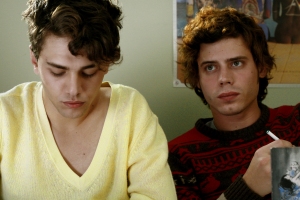
J’ai Tue Ma Mere (in French)
Dir Xavier Dolan
If you have the chance, try to catch J’ai Tue ma Mere, (I Killed My Mother) a coming of age comic-drama about a gay teenager and his troubles with his gauche and difficult, but loving mother. Hubert (Xavier Dolan) doesn’t get along with his mother. He’s smart and well-read, but he isn’t doing well in school. He’d rather spend time with his boyfriend Antonin than in his own home. Hubert and his mother, played, perfectly by Anne Dorval, each try to win one another’s affections but things always devolve into shouting fights between mother and son, until he is forced to move out.
It’s a low-budget movie, but really well done, with believable characters, funny lines, interesting story, good acting. And, amazingly, this semi-auto-biographical film was directed and written by the same 19-year-old (Xavier Dolan) who plays the main character. And it’s a good movie, not just because it was directed by a kid.

Polytechnique (In French)
Dir: Denis Villeneuve
Another Quebec film, beautifully done, but not as successful in my eyes, was Polytechnique, (directed by Denis Villeneuve) a fictionalized version of the 1989 massacre of 14 women at Ecole Polytechnique, the engineering school at the University of Montreal. It’s very similar to Elephant, Gus Van Sant’s great movie Elephant (from 2003), about the killings at Columbine, but Polytechnique was shot in black and white. It is an upsetting and moving period drama of that horrible massacre, in which a crazed gunman shot as many women as he could because they were “feminists”. Which brings me to my beef with this movie.
Like so many other movies, this one feels like it just can’t bare to tell a story through the point of view of a woman. The director gives us the killer’s private thoughts (Maxim Gaudette) as well as some of the victims (in other words, all of the women – but especially Valerie played by Karine Vannasse) but then feels obliged to create a heroic male counterpart to the villain (Sebastien Huberdeaux). So we get something that feels a bit like the old silent movies where a Dudley Do-right rides in to try to rescue the Damsel in Distress from the bad guy. Since it’s a made-up dramatization, would it have been so difficult to make the fictional, tragic hero a woman instead of a man? Especially in a movie about a massacre of women killed for daring to be the equals of men.
Anyway, as I said it’s beautifully shot movie, black and white, set in a wintery Montreal. It’s visually great, and (except for my problem with the film itself) is a good telling of this tragedy.
Also opening very soon are two European movies, one from Romania and one from Austria, both good.
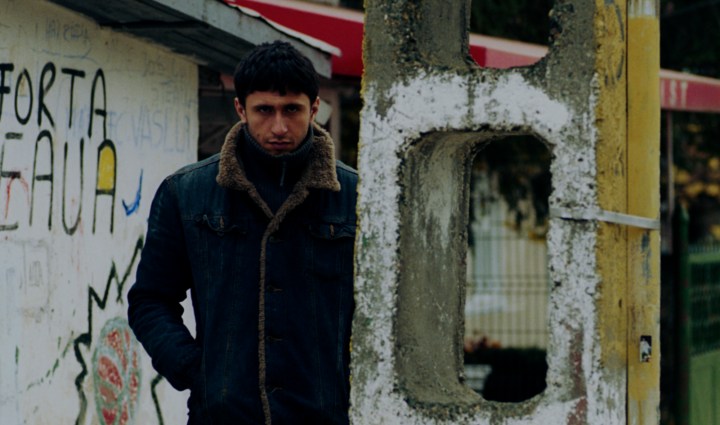
Police: Adjective (in Romanian)
Dir: Corneliu Porumboiu
This movie is about a cop, Cristi, living in a modern, small city in present-day Romania, where people have the trappings of western Europe and modernity, but with the pedantic, rule obsessed absurdity of the communist Ceausescu still strong.
Cristi is asked to launch a sting operation on a high school kid who smokes pot with his friends. Cristi doesn’t think it’s fair so refuses to do so, but is pressured by his boss. His tension at the absurdity of the issue continues in his apartment as he tries to understand the reasoning behind it. His wife/girlfriend, a school teacher, doesn’t help with her own obsession with an awful Eurovision-type song that she tries to analyse (in one of the funniest scenes in the movie.)
This is a very slow-paced “art” film, but I enjoyed it’s off-beat sensibility in its realistic-seeming (at times, maybe, too realistic) depiction of daily life in Romania. Don’t see it expecting another 4 Months, 3 Weeks, and 2 Days (a drama about a Ceausescu-era woman trying to get an illegal abortion). It doesn’t have the narrative drive and tension of that great movie. But it is still very good.

Revanche (in German)
Dir: Gotz Spielmann
Alex a strong ex-con and his beautiful Ukrainian girlfriend Tamara both work at a brothel, Irina in a bedroom, Alex moving boxes in the basement. They sneak away for athletic love-making in his apartment as she tries to teach him Ukrainian. They want to escape the sleazy life of Vienna’s demi-monde and head somewhere warm away from her increasingly sketchy pimp. But they need money,
Alex comes up with a foolproof plan to hold up a bank not far from his estranged grandfather’s country homestead. But things don’t go as planned when a wimpy local cop happens upon the robbery. Alex is forced to hide out at his grandfather’s home. Tension grows as he contemplates revenge – hence the title – and chops away, violently, at a pile of firewood…
This is a great movie that I saw at the Toronto International Film Festival over two years ago but still remember very clearly. When a film resonates for so long it’s a good sign that it’s worth seeing. This is an excellent, moving film, beautifully shot. Alex (Johannes Krisch) and his grandfather (Johannes Thanheiser) are especially good.
– Daniel Garber, January 13, 2009
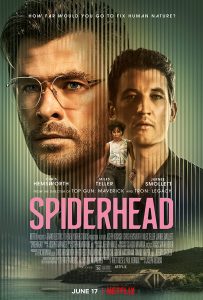
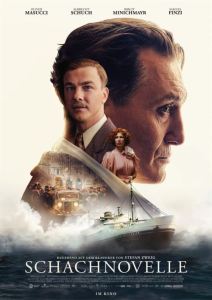

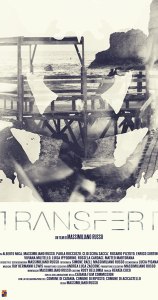





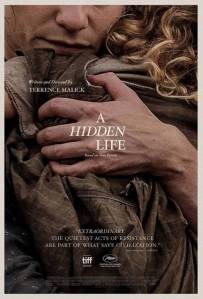
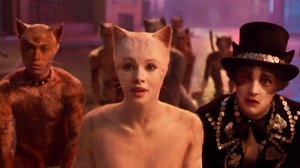
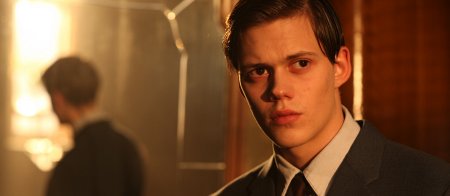
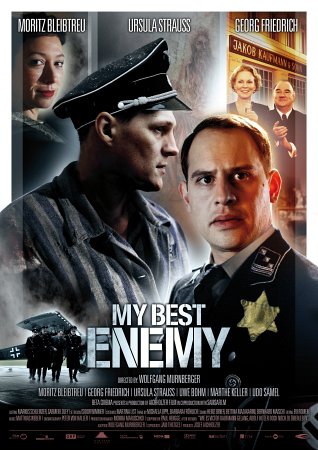
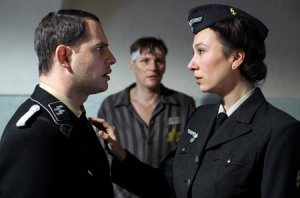
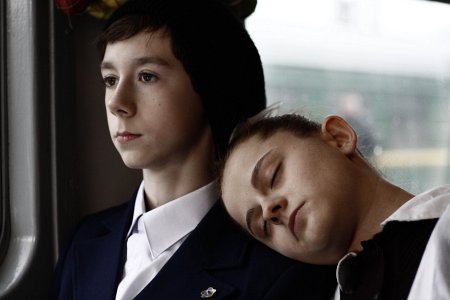
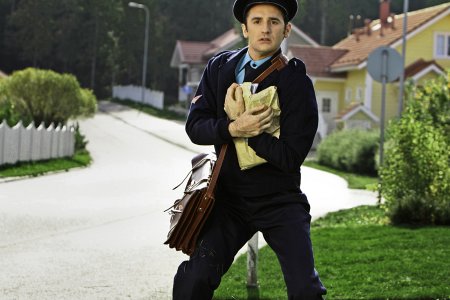

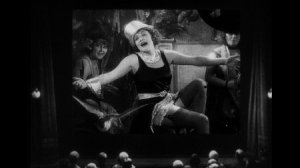

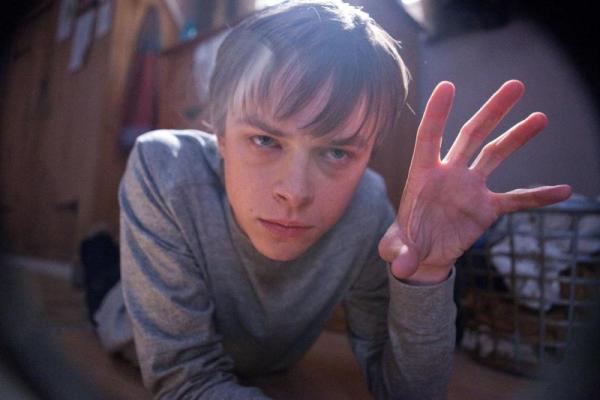
leave a comment